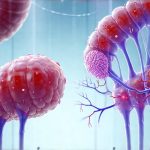Slow digestion and low appetite are often intertwined experiences, frequently signaling underlying issues beyond simple dietary choices. It’s easy to dismiss these symptoms as temporary discomfort—perhaps attributing them to stress or an unusually large meal—but persistent slow digestion can lead to bloating, gas, abdominal pain, and a general feeling of sluggishness. Simultaneously, a consistently diminished appetite isn’t merely about not feeling hungry; it reflects how the body is processing (or failing to process) signals related to food intake, nutrient absorption, and overall energy levels. These two symptoms rarely exist in isolation, hinting at complex interactions within the digestive system and potentially extending into broader physiological states.
Understanding these phenomena requires moving beyond superficial explanations. The human digestive system is an incredibly intricate network, involving mechanical breakdown of food, chemical digestion facilitated by enzymes, absorption of nutrients, and elimination of waste. Any disruption along this pathway can contribute to slow digestion and a subsequent loss of appetite. Furthermore, psychological factors—stress, anxiety, depression—play a significant role, often creating a vicious cycle where digestive issues exacerbate mental health challenges, and vice versa. This article will explore the nuances of these conditions, examining potential causes, recognizing associated symptoms, and discussing supportive strategies for managing them – always emphasizing the importance of professional medical evaluation.
Understanding Slow Digestion
Slow digestion, medically termed delayed gastric emptying, isn’t a disease in itself but rather a symptom indicating something is interfering with the normal pace of food moving through the digestive tract. This can happen at various points along the system: from the stomach to the small intestine, and onward. Several factors can contribute to this slowing down. These include anatomical obstructions (though less common), nerve damage affecting gut motility, certain medications (opioids are a well-known example), or underlying medical conditions like diabetes or hypothyroidism. However, in many cases, the cause remains idiopathic, meaning it’s unknown. The consequence of slow digestion is that food sits for longer periods, potentially leading to fermentation and gas production which explains common symptoms like bloating and discomfort.
The speed at which your stomach empties is influenced by a multitude of factors, including the composition of the meal itself – high-fat foods digest slower than carbohydrates or protein – and individual physiological variations. Stress can also play a significant role; when stressed, the body often prioritizes energy conservation over digestion, slowing down gut motility. Chronic stress, therefore, can contribute to persistent digestive issues. Importantly, slow digestion isn’t necessarily about how much you eat but rather how efficiently your system processes what you do consume.
Recognizing the symptoms of slow digestion is crucial for seeking appropriate support. These symptoms are often vague and easily attributed to other causes, making diagnosis challenging. Beyond bloating and abdominal discomfort, individuals might experience nausea, early satiety (feeling full quickly), heartburn, and even changes in bowel habits – either constipation or diarrhea depending on how the slowed digestion impacts downstream processes. It’s important to note that these symptoms can overlap with those of other gastrointestinal disorders, emphasizing the need for a comprehensive medical evaluation. If you’ve had gallbladder removal, this may play a role in digestion too.
The Role of Gut Microbiota
The gut microbiota—the trillions of bacteria, fungi, viruses, and other microorganisms residing in our digestive tract—is increasingly recognized as a key player in both digestion and appetite regulation. A healthy gut microbiome supports efficient digestion by aiding in the breakdown of complex carbohydrates, synthesizing essential vitamins, and strengthening the intestinal barrier. However, imbalances in the gut microbiota (dysbiosis) can disrupt these processes, contributing to slow digestion and reduced nutrient absorption. – Dysbiosis may lead to increased gas production due to altered fermentation patterns. – It can also compromise the integrity of the intestinal lining, potentially causing inflammation and affecting motility. If you are on hormonal birth control, this might impact your gut microbiome.
Maintaining a diverse and balanced gut microbiome is essential for optimal digestive health. This can be achieved through several strategies: – Consuming a diet rich in fiber from fruits, vegetables, and whole grains. Fiber serves as food for beneficial bacteria, promoting their growth and diversity. – Incorporating fermented foods like yogurt, kefir, sauerkraut, and kimchi into your diet. These foods contain live probiotics—beneficial microorganisms that can help restore gut balance. – Avoiding excessive use of antibiotics, which can disrupt the microbiome’s delicate ecosystem. If antibiotic use is necessary, consider supplementing with probiotics afterwards to help repopulate the gut. Can low FODMAP diets backfire and cause gas too?
The Impact of Stress & Anxiety
The connection between mental health and digestive function is profound. The gut-brain axis—a bidirectional communication network linking the brain and the gastrointestinal tract—allows for constant interplay between psychological state and digestive processes. When we experience stress or anxiety, our bodies release hormones like cortisol, which can significantly impact digestion. Cortisol slows down gut motility, reduces stomach acid production, and alters intestinal permeability. This leads to a cascade of effects: delayed gastric emptying, impaired nutrient absorption, and increased inflammation.
Chronic stress isn’t just about occasional feelings of worry; it’s a sustained physiological state that continuously disrupts digestive function. This can create a vicious cycle where digestive symptoms exacerbate anxiety, leading to further stress and worsening the condition. Techniques for managing stress are therefore crucial for improving both digestive health and overall well-being. – Mindfulness meditation: helps calm the nervous system and reduce cortisol levels. – Deep breathing exercises: activate the parasympathetic nervous system, promoting relaxation and digestion. – Regular physical activity: releases endorphins and reduces stress hormones. Can excessive sitting contribute to this too?
Lifestyle Modifications & Dietary Adjustments
Addressing slow digestion often involves a combination of lifestyle modifications and dietary adjustments. There is no one-size-fits-all solution, as individual needs vary depending on the underlying cause. However, several general strategies can be helpful. First, consider portion sizes – smaller, more frequent meals are generally easier to digest than large ones. Second, pay attention to food combinations; some individuals find that combining certain foods (e.g., fruit with protein) leads to increased bloating and discomfort. Third, chew your food thoroughly before swallowing – this initiates the digestive process and reduces the burden on the stomach.
Dietary adjustments may also involve identifying and eliminating trigger foods – those that consistently exacerbate symptoms. Common triggers include: – High-fat foods. – Processed foods. – Carbonated beverages. – Artificial sweeteners. Beyond dietary changes, staying adequately hydrated is crucial for optimal digestion. Water helps soften stool, promotes gut motility, and aids in nutrient absorption. Finally, regular physical activity can stimulate digestive function and reduce stress levels. Remember to consult with a healthcare professional or registered dietitian before making significant dietary changes – especially if you have underlying health conditions. Midday meal plans can also help manage these symptoms.
Low Appetite: Beyond Just Not Feeling Hungry
Low appetite, also known as anorexia (not to be confused with the eating disorder), is frequently a symptom of an underlying issue rather than a problem in itself. It’s often linked to slow digestion because when food sits undigested for extended periods, it can create a sense of fullness and discomfort, leading to decreased motivation to eat. However, low appetite can also stem from various other causes, including psychological factors like depression, anxiety, or stress; medical conditions like infections, chronic diseases, or medication side effects; and even simple things like fatigue or dehydration. Distinguishing between temporary loss of appetite due to illness or emotional upset and a persistent reduction in appetite is important for determining the appropriate course of action.
The physiological mechanisms behind appetite regulation are complex, involving hormones like ghrelin (which stimulates hunger) and leptin (which signals fullness). Disruptions in these hormonal pathways can contribute to low appetite. For example, chronic stress can suppress ghrelin production, while inflammation can interfere with leptin signaling. Furthermore, the brain plays a crucial role in interpreting hunger cues; if you’re preoccupied or emotionally distressed, your brain may not register feelings of hunger effectively. It’s essential to understand that low appetite isn’t simply about willpower – it’s often a physiological response to underlying factors.
Recognizing the signs of low appetite is important for seeking appropriate support. These include: – A noticeable decrease in food intake. – Lack of interest in food, even favorite foods. – Feeling full quickly after eating only a small amount. – Weight loss or difficulty maintaining weight. It’s crucial to differentiate between a temporary lack of appetite and a persistent reduction in food intake that is causing concern. If you experience prolonged low appetite accompanied by significant weight loss or other concerning symptoms, it’s essential to consult with a healthcare professional. How GERD affects appetite can also play a role here.
The information provided in this article is for general knowledge and informational purposes only, and does not constitute medical advice. It is essential to consult with a qualified healthcare professional for any health concerns or before making any decisions related to your health or treatment. How fast you eat can also impact digestion and appetite.


















